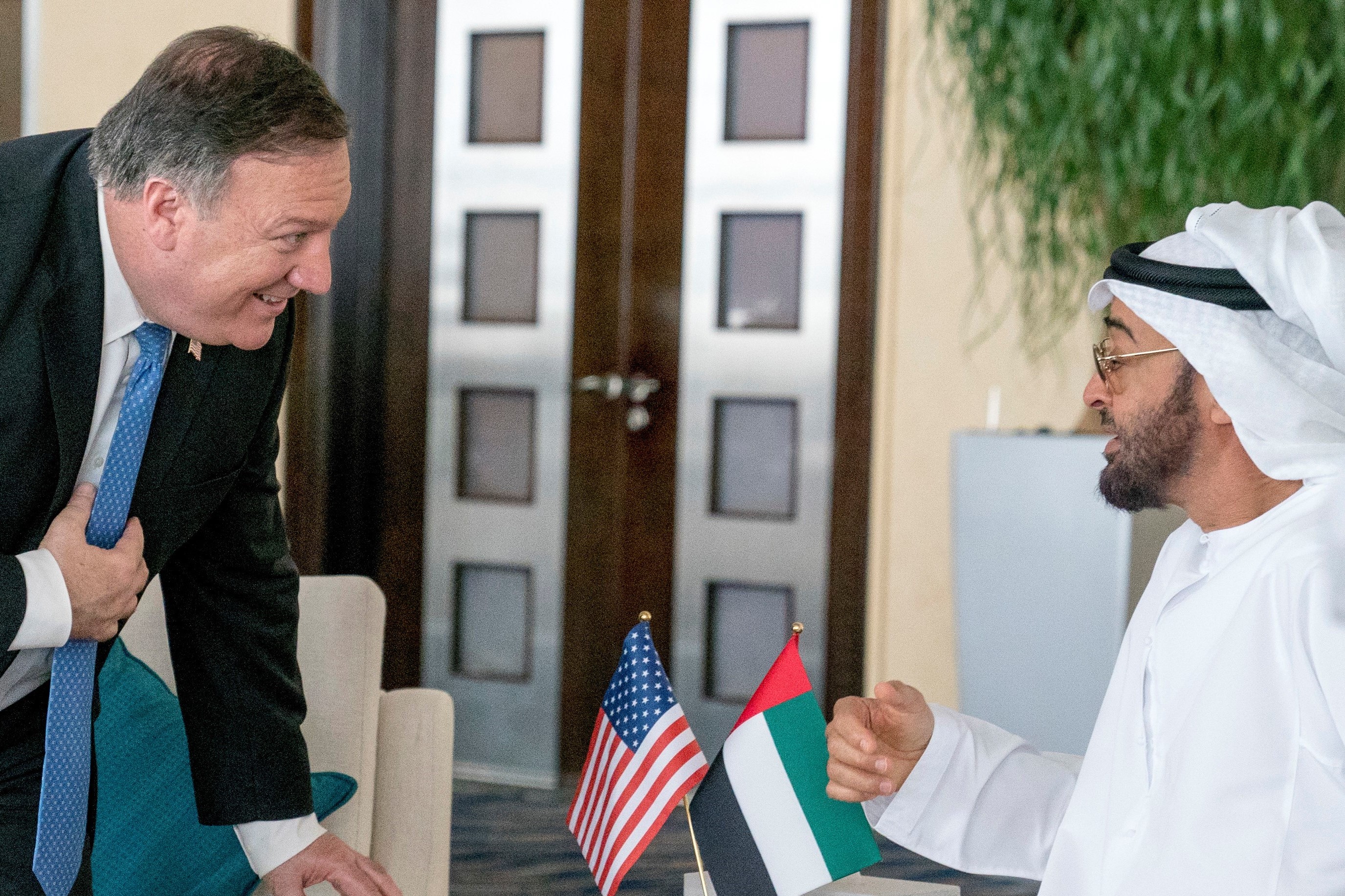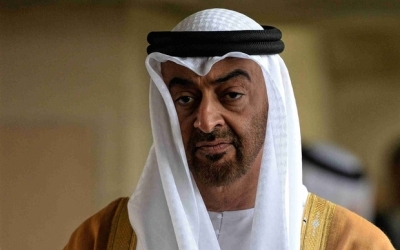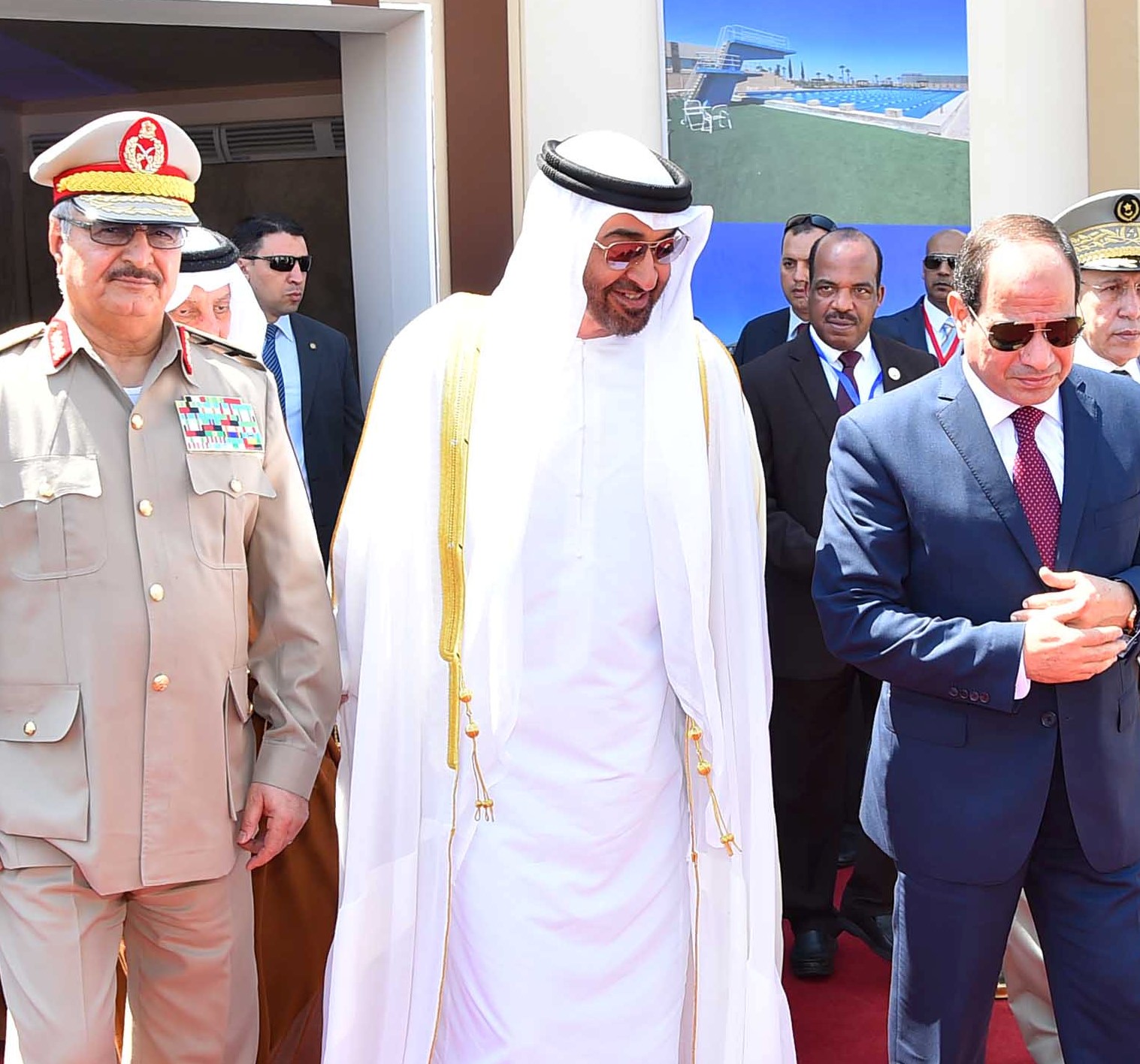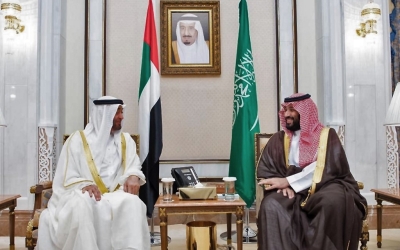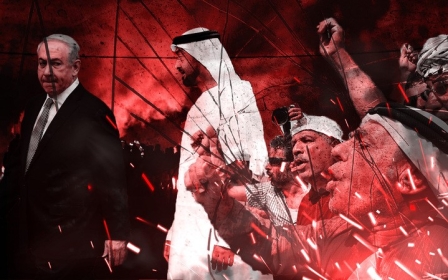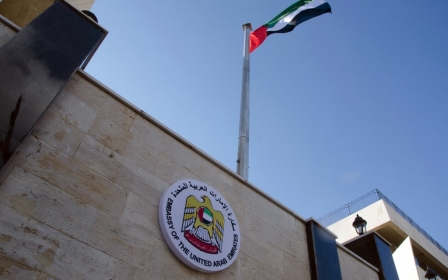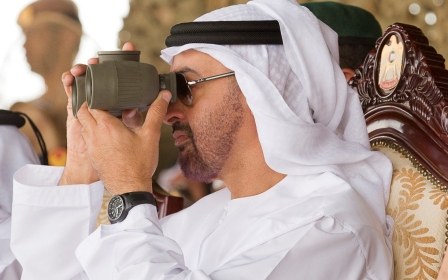Mohammed bin Zayed's mission impossible
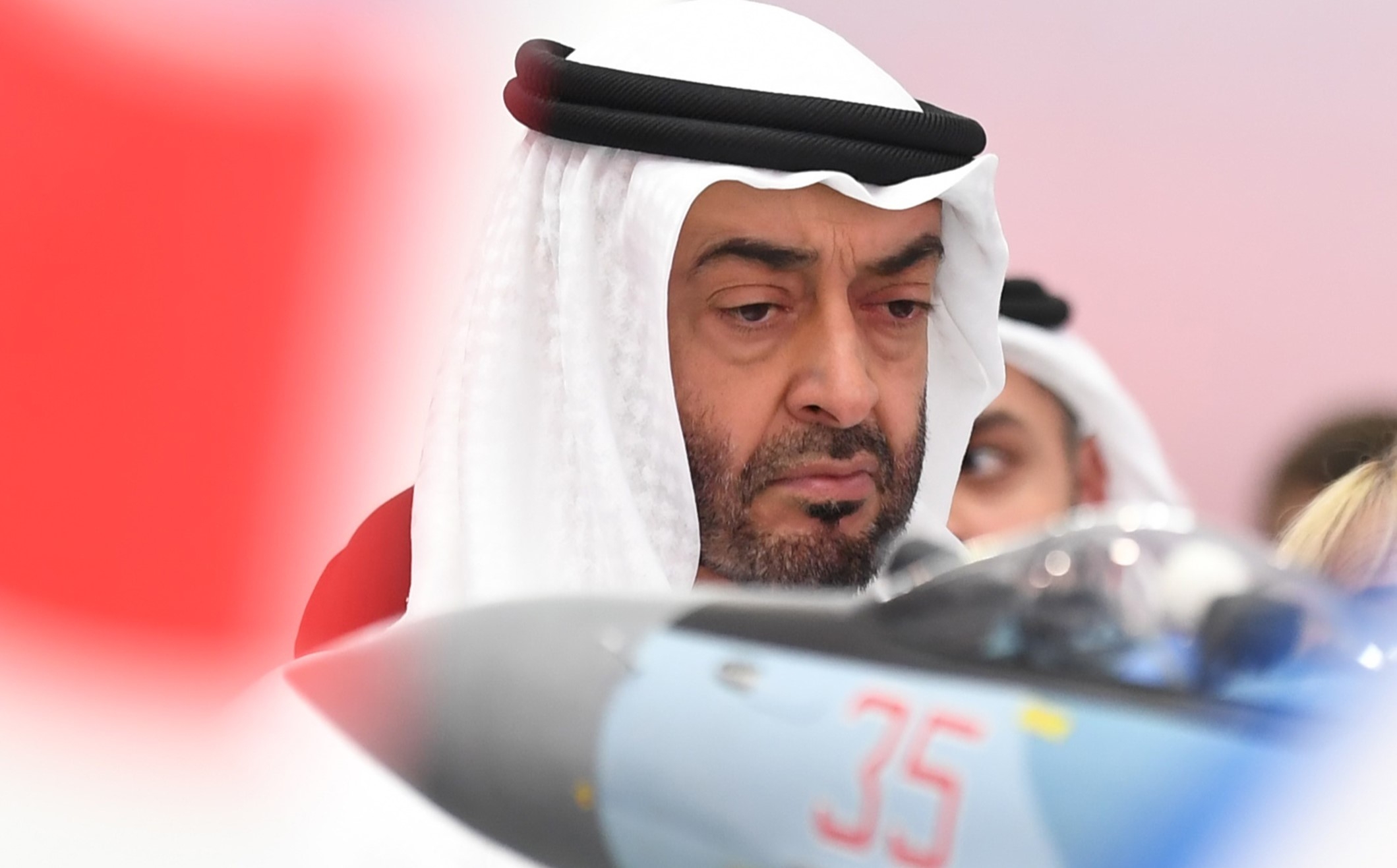
The Arab uprising that took place in 2011, and the cameo appearance of democracy in Egypt, unleashed a wave of military interventions, coups and civil wars that shows no signs of exhaustion even after a decade.
The targets of this campaign are either dead, in prison or in exile - the Muslim Brotherhood in Egypt, al-Qaeda and the Islamic State group in Syria and Iraq are all diminished forces. While these are mutually exclusive forces, in the eyes of the counter-revolution they are the same.
The mentor
Islamism in any form, political or militant, is a fraction of the force it used to be in 2011, and for the foreseeable future it is incapable of summoning hundreds of thousands onto the streets and toppling regimes, as it once did in Tunisia, Egypt and Yemen.
Islamism in any form, political or militant, is a fraction of the force it used to be in 2011
And yet the counter-revolution, unleashed when Mohamed Morsi was toppled as Egypt's president in 2013, continues furiously.
New MEE newsletter: Jerusalem Dispatch
Sign up to get the latest insights and analysis on Israel-Palestine, alongside Turkey Unpacked and other MEE newsletters
It produces identikit dictators: Mohammed bin Salman in Saudi Arabia, Abdel Fattah el-Sisi in Egypt, Khalifa Haftar in Libya, all pour scorn on free elections, live like pharaohs, and create dynasties for their family and sons.
They are all beholden to one man who has either funded, armed or mentored their rise to power.
This man is the organising genius of coups in Egypt; he has become a major player in the civil war in Libya; he is leveraging his country's ports to become a presence in the Horn of Africa; he has pushed the Saudis into a war in Yemen to promote late Yemeni president Ali Abdullah Saleh's son, and then ditched that strategy to promote southern separatists; he was instrumental in launching the blockade of his neighbour Qatar; he introduced an unknown Saudi prince to the Trump clan and cast the CIA's man in Riyadh on the scrap heap.
There is no pie in which Mohammed bin Zayed, the crown prince of Abu Dhabi, doesn't have a finger. He rarely makes speeches or gives interviews, and when he does he comes across as casual, reticent, softly spoken.
On the rare occasions he talks to a journalist, as he did to Robert Worth of the New York Times, he portrays himself as the reluctant first responder, the fireman dousing dangerous wildfires: the September 11 attacks (two of the hijackers were Emiratis) and the Arab Spring were two such galvanising events.
This is an act, and largely for a Western audience.
MBZ's 'Islamist menace'
As time has elapsed, this can not be the whole story. As MBZ has developed his counter-jihad, so have the ambitions expanded of this quiet, English-speaking, Sandhurst-trained prince.
MBZ knows how to manipulate decisions in the White House. He can read their ignorance, arrogance, and personal greed. His money goes directly into their pockets
Thwarting the looming Islamist menace - as he describes it - can no longer account for the ambition, scope and cost of his dreams. The Islamist menace of his nightmares is largely dormant.
A shrewd observer, he can see, as clearly as anyone, the US crumbling as an organising power in the Middle East. He knows how to manipulate decisions in the White House. He can read their ignorance, arrogance, and personal greed. His money goes directly into their pockets. He can play on the chaos of real-time decision-making in the Oval Office like a mandolin.
It must have occurred to him that the Middle East needs a new ruler. Why not him? It's time, he has judged, to move out of the shadows and lay out his own stall.
So what's the mission?
Mission statement
This was, some might say boldly, put into words by MBZ’s best operator abroad, his ambassador to the US, Yousef al-Otaiba, recently.
The op-ed he wrote in Israel's Yedioth Ahronot was ostensibly to warn Israel that annexation in the West Bank was a bridge too far. Writing in Hebrew, Otaiba posed to a Jewish audience as a friendly Arab - "one of three Arab ambassadors in the East Room of the White House when President Trump unveiled his Middle East peace proposal in January," he reminded them.
The UAE and Israel are an item. No need for the loving couple to hide behind the bushes
In fact, the letter was no such thing. It certainly wasn’t a message from the Palestinians themselves. The UAE has no problems with the Israeli occupation and will overtly send two planes full of personal protection equipment (PPE) to Ben Gurion airport and make any number of high-profile trade deals with Israel to reinforce their intent to normalise relations.
The days of disguising the flight plans of aircraft from Abu Dhabi to Ben Gurion airport by making them disappear over Jordan are long gone. The UAE and Israel are an item. No need for the loving couple to hide behind the bushes. Nor was it a message from Jordan, which regards annexation of the West Bank as an existential threat to the kingdom.
It turned out to be a message from liberal Jews in America to right-wing Jews in Israel. The mastermind of this operation was the American Israeli billionaire Haim Saban, according to a report in Axios. A former adviser to Netanyahu, Caroline Glick called the letter Saban's brainchild.
In any case, it had little to do with Arab opinion. It did, however, contain another more important message: MBZ's mission statement appears in two key paragraphs Otaiba wrote.
"With the region's two most capable militaries, common concerns about terrorism and aggression, and a deep and long relationship with the United States, the UAE and Israel could form closer and more effective security cooperation.
"As the two most advanced and diversified economies in the region, expanded business and financial ties could accelerate growth and stability across the Middle East," Otaiba wrote.
In these sentences, UAE not only claims to have a military stronger than that of both Egypt and Saudi Arabia but, fantastically, it also claims to have the strongest and most diversified economy in the Arab world.
Those are some boasts for the crown prince of a tiny Gulf city state to make.
"Little Sparta" has big ambitions.
Israel's junior partner
By comparing its military reach to Israel's, the UAE is sidelining its allies in the Saudi and Egyptian armies. But this is of little importance. Mohammed bin Zayed wants to turn his statelet into another Israel.
Both countries are small in size and population. Both are deeply militarised societies. Israel’s "citizen's army" is well known. The draft that MBZ introduced for Emirati men in 2014 and expanded from 12 to 16 months in 2018 is less well known.
Both countries have a military and economic reach which extends far beyond their borders and into the heart of Africa. If Israel has shown it has a long arm that can reach to Entebbe and all over the world to exact revenge, so too has UAE shown its long arm in Libya, Turkey, Syria - nations far away from the Gulf.
Both have a dynamic population that can serve Western interests. They have common enemies - Islamism, Turkey, Iran. They have a common strategy to control the region. The two largest regional challenges for the Emirates and Israel are Turkey and Iran respectively.
The Emiratis confront the Turkish President Recep Tayyip Erdogan head-on. They funded an attempted Gulenist coup in 2016. They oppose his forces in Idlib by paying Bashar al-Assad to break the ceasefire arranged by the Russians, and the UAE confronts Turkish forces in Libya.
When unidentified bombers attacked Turkish air defence batteries in the newly recaptured Libyan airbase of Al-Watiya, Abdulkhaleq Abdulla, an adviser to the Emirati royal court, tweeted: "On behalf of all Arabs, the UAE has taught a lesson to Turks."
There can only be one bulldog on the block and Israel has no intention of sharing that role with an Arab with ideas above his station
He deleted it afterwards.
But Israel itself stays in the background. It regards the Turkish military as its main threat. As I reported in January last year, Yossi Cohen, the head of Mossad, told a meeting of diplomats from Saudi Arabia, UAE and Egypt in a Gulf capital that Israel considered Turkey's military to be more capable and less easily containable that Iran's. But Israel itself does not confront Turkey.
Similarly, the UAE does not confront Iran, even when tankers are mined outside an Emirati port. The kinetic stuff is done by Israel, which is believed to be responsible for a large explosion in Natanz in workshops which assemble centrifuges to enrich uranium, and possibly for up to six other mysterious explosions in Iran too.
Regionally, the UAE and Israel work in tandem, each covering the other's back. But this does not mean that the project itself is stable or long term. Israel may indeed find it useful to play along with MBZ's ego to serve its own interests of keeping the Palestinians under permanent occupation.
But its national interests come first.
Otaiba's chutzpah sparked a lively reaction from Glick, who wrote in Israel Hayom: "No one is doing anyone any favors. And if we're already on the subject of favors, the stronger side in this partnership is Israel. The Israeli economy is much more robust that the oil economies of the Persian Gulf. Who does Otaiba think he's scaring with his threats when oil is selling at $37 a barrel?"
There can only be one bulldog on the block, and Israel has no intention of sharing that role with an Arab with ideas above his station.
The second problem with MBZ's mission is his Sunni Arab allies. When the Saudis and Egyptian military elites realise that their own national and commercial interests are suffering, they will start to look at MBZ's pyrotechnic adventures differently.
The maritime deal that Turkey signed with the UN-backed government in Tripoli gives Egypt greater access to maritime riches than it could possibly have in a deal with Cyprus and Greece, and yet Egypt denounced the deal as illegal.
Similarly the carving up of Yemen by the UAE, which has now occupied the Yemeni island of Socotra and is backing southern separatists in Aden, is not in the interests of Riyadh, which is primarily concerned about maintaining the security along its southern border and installing a puppet regime in Sanaa.
History lessons
Israel should not be fooled by expressions of support from the UAE's satraps, like Abdul Salam al-Badri, deputy prime minister of the eastern Libyan-based government in Tobruk, or Hani bin Breik, the vice chairman of the Southern Transitional Council in Aden, who by the way is a Salafist.
History bodes ill for MBZ's project. Every Arab state that has worked with or recognised Israel is today weaker and more divided as a result
History bodes ill for MBZ's project. Every Arab state that has worked with or recognised Israel is today weaker and more divided as a result. This goes for Egypt and for Jordan, both of whose diplomats, who once thought of themselves as pioneering, regret what they did in the name of peace. It proved a bitter false dawn.
The economic miracle both countries were promised at the time never materialised, the Palestinian conflict is as intractable as ever, and historic Palestine is weaker and smaller than ever before.
Jordan, which has worked more closely with Israel than any other Arab country, is tottering on the verge of bankruptcy, mass unemployment and social breakdown. Its strategic interests in the West Bank and Jerusalem count for nothing with the dominant settler right-wing in Israel.
Fatah, which recognised Israel, is asking itself the same questions. Why did we do it at Oslo? What was it for? That debate is bringing it closer to its rival, Hamas.
A doomed alliance
The reality is that the dalliance between Israel and the UAE is doomed. It is the work of individuals, not peoples. MBZ's plots and stratagems are his own, not his nation's.
The Arab street is implacably opposed to recognising Israel until a just solution is found for the Palestinians, a solution involving their own land and their own right of return.
MBZ's mission is mission impossible and the sooner his Arab allies see that, the sooner they can prevent a second decade of regional war
The MBZ-Israel project is poison for the region. It is not Israel coming to terms with its neighbours. It is making fools out of them.
Before the Syrian and Libyan civil wars, Turkey did not have an interventionist foreign policy. It has one now. Similarly, Iran's military reach never really extended beyond the Shia minorities of the Sunni Arab states, and that is taking its military support for Hezbollah and its financial support for Hamas into account.
Iran never actually threatened Israel's military dominance as Cohen himself acknowledged in that meeting in a Gulf state over a year ago. Iran, from Mossad's point of view, is containable.
MBZ's mission is mission impossible, and the sooner his Arab allies see that, the sooner they can prevent a second decade of regional war.
The views expressed in this article belong to the author and do not necessarily reflect the editorial policy of Middle East Eye.
This article is available in French on Middle East Eye French Edition.
Middle East Eye delivers independent and unrivalled coverage and analysis of the Middle East, North Africa and beyond. To learn more about republishing this content and the associated fees, please fill out this form. More about MEE can be found here.



